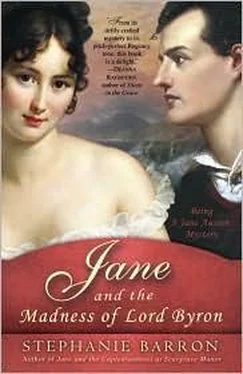The only possible motivation for such an act must be to see the poet tormented, upon the discovery of his beloved’s corpse; or to see his lordship hang.
If Byron were innocent of Catherine’s death, then he, as well as the unfortunate girl, was the victim of a merciless intelligence. There was cruelty and forethought in the execution of the whole; someone had derived pleasure from dropping that sodden package in his lordship’s bed.
It smacked of hatred. Or a desire for vengeance. And in all this, the life of a young girl had been snuffed out as nothing.
And so, after a pause, I penned the last of my queries on the Castle’s sheet of paper:
13. Who, among the respectable and the highborn of Brighton, hates Lord Byron to the point of madness?
Chapter 16 Conflicting Testimony
WEDNESDAY, 12 MAY 1813
BRIGHTON, CONT.
MY PERIOD OF REFLECTION WAS BROKEN BY A KNOCK AT the bedchamber door. A footman stood in the passage, with the intelligence that my brother awaited me downstairs—with a party of friends.
“Has the inquest adjourned?”
“Not a quarter-hour ago, ma’am.”
I hastened below, and discovered Henry established in a little side-parlour with the Earl and Countess of Swithin; all three were taking glasses of something fortifying—brandy, in the case of the gentlemen, and ratafia, in the person of Desdemona.
“What is the coroner’s verdict?” I enquired, as I accepted a glass of wine.
“Oh, murder, of course,” Swithin said grimly; “but to everyone’s surprize, it was brought back against a person or persons unknown . There is much talk as to the motives in such a judgement; it was said at first that the Regent must have intervened, to preserve the freedom of a celebrated poet and nobleman; but those acquainted with the two gentlemen are well aware that no love is lost between them, the Regent detesting the very sight of George Gordon. His Royal Highness finds the poet’s club foot distasteful, and cannot forgive him for forming a part of Princess Caroline’s court. So there is astonishment in many quarters. Old Sir Harding Cross cannot be to blame, as he owes his position to the Regent; it was hardly he who taught the jury mercy. Perhaps it was Frogmore, the coroner, who urged caution.”
“For a wonder,” I observed, “a coroner’s panel has drawn a conclusion independent of the magistrate—and declined to hang a man who insists he was elsewhere when murder was done! What is likely to happen now?”
“Byron shall have to go to ground, somehow,” Henry said. “There are any number of folk in Brighton out for his blood, chief among them the poor young lady’s father.”
“General Twining was in attendance, I apprehend?”
“He testified as to the remains being his daughter’s, at which point the panel was required to view the corpse. Several went quite green, I understand. The General said only that he had entrusted his daughter to the chaperonage of Mrs. Silchester, who had failed in her duties; that he had quitted the Assembly Rooms at the decent hour of eleven o’clock; ordered Miss Twining’s maid to wait up for her; and was roused at five o’clock in the morning with the intelligence that his daughter had never returned. He suspected, he claimed, a further abduction on the part of Lord Byron—and informed the Brighton constables of the fact.”
“Abduction? So the tale of Cuckfield came out—and still the jury did not find against his lordship?”
“It was viewed, rather, as a point in Lord Byron’s favour; a man who wished so ardently for a Flight to the Border can hardly be suspected of murdering his lady.”
“General Twining cannot have regarded the matter thus.”
“No, indeed,” Henry agreed. “Having given his evidence—and heard Mrs. Silchester, amidst much tears and lamentation, assure the panel that Lady Caroline Lamb had been most insistent upon carrying Miss Twining away to the Pavilion—the General retired into his handkerchief. His face emerged from it only at the announcement of the panel’s verdict—at which, in a rage, he slapped Lord Byron’s face with said handkerchief, and vowed to see him dead at twenty paces if he were to escape hanging.”
“Lord!” Desdemona breathed. “And Byron?”
“—Merely looked contemptuous; and said he should be only too happy to meet the General, his honour and reputation having suffered injuries enough already at his hands. Scrope Davies—who provided my intelligence—said Byron has long hated the fellow, and might more readily have drowned the father than the daughter.” Henry rubbed his nose in speculation. “I daresay poor Byron’s life is not worth a farthing in Brighton at this present. Your Lady Oxford might take him back to London, Countess—but for the magistrate’s demand that Byron remain in town for the nonce.”
“Are further researches to be undertaken? Does the magistrate mean to learn the truth of Miss Twining’s death?” I enquired.
“Not at all,” Mona scoffed. “It is as I predicted; Sir Harding shall be content to say that persons unknown killed the girl, and have done.”
“I cannot agree, my love,” Swithin objected. “Indeed, I think Old HardCross intends to charge Byron regardless of the inquest’s judgement. It is within his office, you know, provided he can recruit his proofs, and present them along with Byron at the next Assizes.”
“The magistrate is a fool if he believes Byron should be witless enough to leave Miss Twining’s body in his own rooms. Good God,” Desdemona said bitterly, “had he indeed drowned the poor child, as all of Brighton supposes, he had merely to leave her lying on the shingle! For what possible purpose should he have taken a hammock from his own yacht, and sewn her into it like a lost seaman, in order to carry her to his bed?”
“The hammock was indeed Byron’s?” I repeated, startled.
“Yes,” Henry supplied. “The word Giaour , you will recall, was embroidered on the canvas—and as you correctly divined, that is the name of Byron’s boat. It is a Turkish word, apparently, meaning infidel, or heathen … or … some such. Sir Harding would have it the hammock alone indicts his lordship.”
“Nonsense!” Desdemona cried. “Does any murderer leave his calling-card on the body?”
“Sir Harding can think of nobody else to blame, my dear,” her husband soothed. “This adjournment is a lull in the battle merely, with further salvos to come.”
“But what did Lord Byron say, that so persuaded the jury of his innocence?” I demanded.
“It was his valet, rather than Byron himself, who moved them,” Henry supplied. “The man is Brighton born and bred. Byron employs him only when he chances to descend upon the town for a bit of sailing; and with little in the nature of loyalty due to such an indifferent master, the valet—one Chaunce by name—was readily credited by his fellows on the panel. He declared that Byron returned to the Arms at a quarter to one in the morning, well before Miss Twining is known to have quitted the Assembly with Lady Caroline Lamb, which may be put at one o’clock; and that his lordship demanded that his bags be packed. He paid his shot with the innkeeper while Chaunce collected his traps. Chaunce and Byron then quitted the Arms for Mr. Scrope Davies’s house, Davies affirming that he had waited in the publick rooms and escorted Byron and his man to his own lodgings. At no point was Byron out of sight of either of his fellows—he cannot then have effected murder.”
“Did Mr. Davies say when they achieved his lodgings?” I asked swiftly.
“He would put it at perhaps a quarter to two in the morning. He and Byron sat up drinking Port, and talking over the regrettable behaviour of Lady Caroline Lamb. I’m told that Byron declared he fled the King’s Arms in order to avoid Lady Caro—he was certain she would attempt to breach his rooms that night, as she is forever doing. The two gentlemen sought their beds at three o’clock. Byron was up again at eight, mounted and riding north for London. All this he told the coroner, under oath.”
Читать дальше












